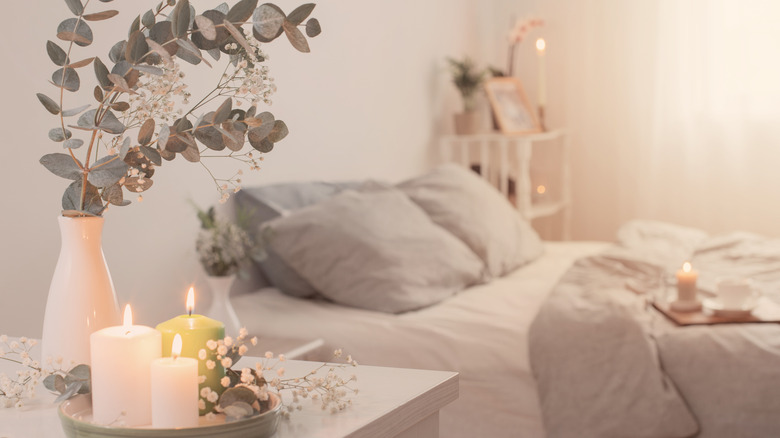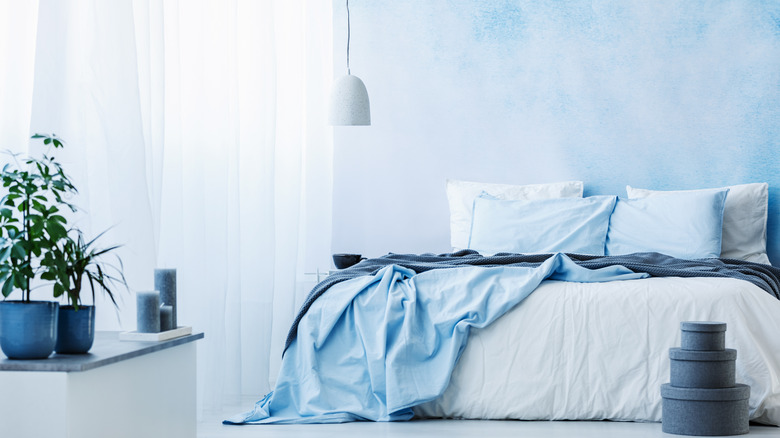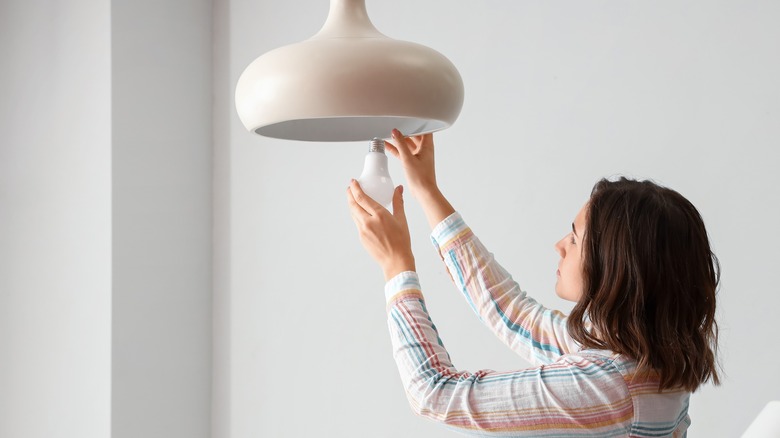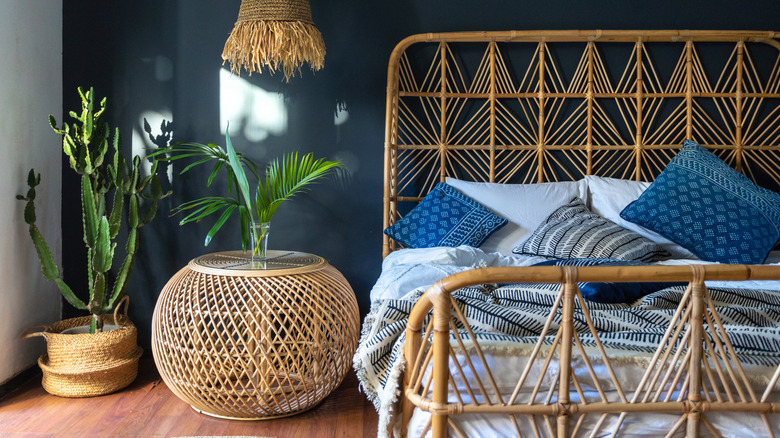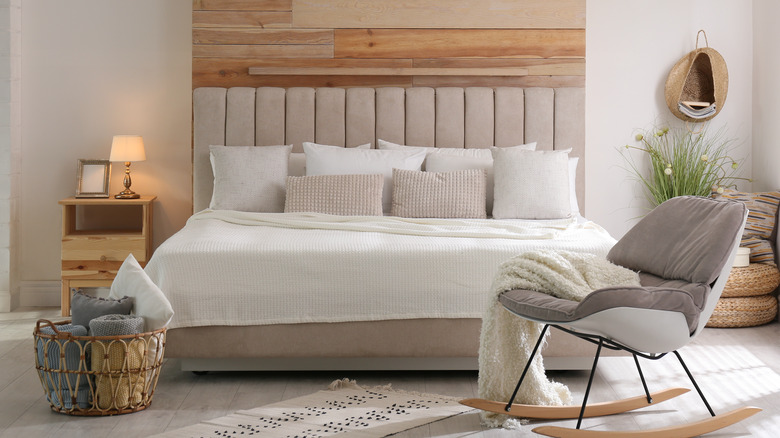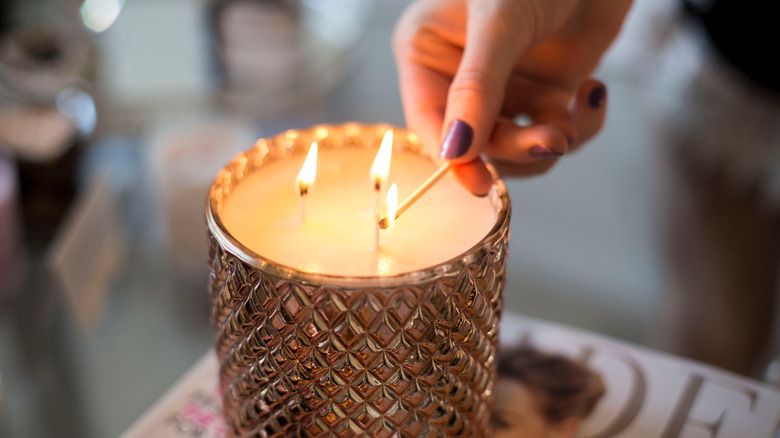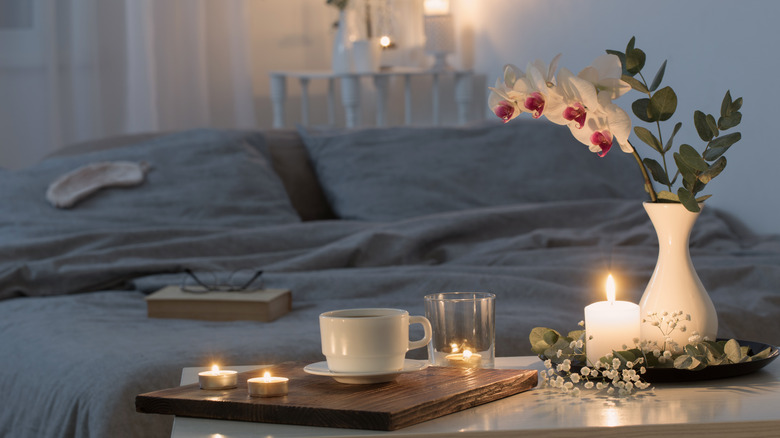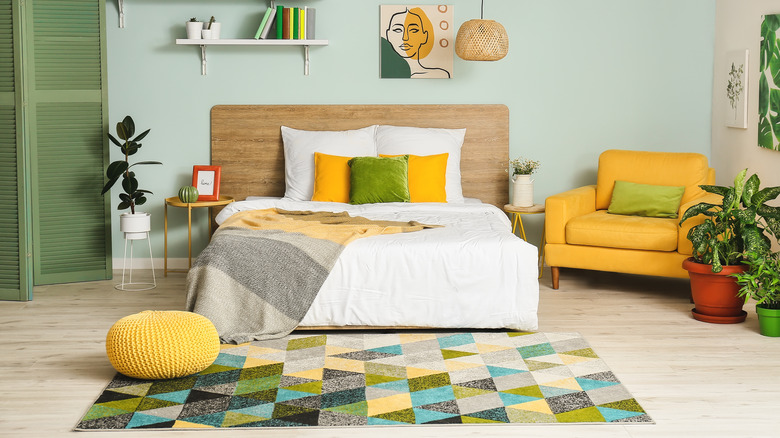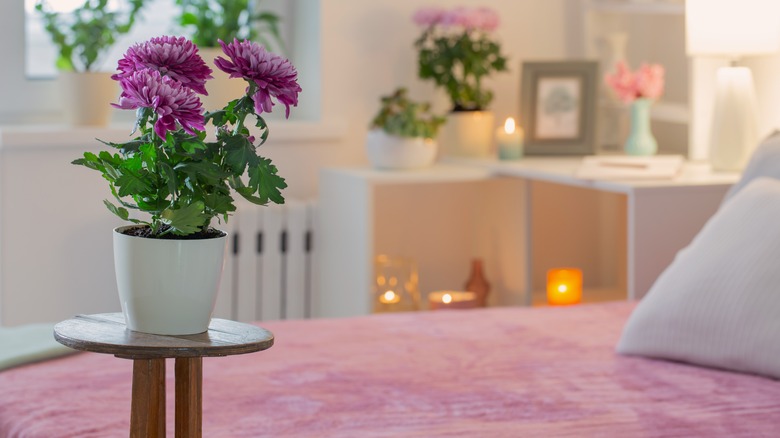10 Super Simple Ways To Make Your Bedroom Comfy And Cozy
We may receive a commission on purchases made from links.
Ever stay at a hotel and feel rejuvenated after a fantastic sleep? Do you wish you could have that feeling hygge at home? If so, we have great news! Your bedroom can become a relaxing sanctuary to unwind and get quality sleep so you can feel energized and fresh to take on the next day's tasks.
Unfortunately, according to CDC, more than a third of adults in the United States don't get enough sleep. "Sleep is incredibly fragile and easily affected by intrinsic and environmental factors," says Dr. Chester Wu, who is double board certified in Psychiatry and Sleep Medicine. "While the main environmental concerns for optimal sleep are that the bedroom is cool, dark, and quiet, sleeping comfort and the positive associations one has where they sleep are also important," he adds.
Debbe Daley, an award-winning interior designer, told The List that "creating a relaxing bedroom doesn't have to break the bank, and by implementing simple ideas, your bedroom will become a sanctuary for relaxation." To help you have the bedroom of your dreams (pun intended), we've put together simple, cost-effective expert-based tips for you to implement. So, get ready to rest in a comfy and cozy bedroom that you'll never want to leave. So, settle in, and grab a hot beverage and a notepad! We are sure you're going to want to write these things down.
A calming color scheme will help you relax
Your bedroom should invoke a sense of serenity, and selecting a suitable color scheme is a way to create and promote relaxation. According to scientific research, specific colors can help enhance your mood. For example, in a 2018 study published in Frontiers in Psychology, being surrounded by any shade of blue promotes calmness. For those who want a simple calming color scheme, interior designer Debbe Daley recommends opting for a neutral bedroom palette and says you should use "whites, creams, beiges, taupe with soft accents of turquoise and blues for a calming feel."
Although neutral colors in the bedroom can inspire comfort and relaxation, Diana Hathaway, an interior and feng shui designer, and a color expert, says you can get that same vibe "with a monochromatic color palette." Hathaway told The List that by "choosing shades of the same color for bedding, walls, and accessories, you've created a low-stress environment with just the right amount of cozy."
Be thoughtful about lighting
Most people overlook the importance of lighting in the bedroom, but getting bedroom lighting right can help you catch those z's more quickly. "It's hard to feel comfortable in your bedroom when all you have is a standard light fixture above the bed," says interior decorator Diana Hathaway. Instead, Hathway recommends prioritizing lighting for any cozy bedroom makeover, which means assessing your lighting and bulbs. "Layering your lighting is the best strategy for a comfortable space — include general overhead lighting, bedside lighting, and ambient lighting to set the right mood," Hathaway explains.
Interior designer, Debbe Daley, says window treatments can help warm up a space. "Side panels for privacy can be opened to let in light and can be drawn at night for that warm cozy feel," says Daley. "Roll-up natural shades are inexpensive and provide texture and warmth to a room as well," she adds.
Dr. Chester Wu, who provides sleep medicine services, medication management, and psychotherapy to adults, says making sure that your room is dark before you fall asleep is very important. "Consider investing in blackout curtains or wearing an eye mask," says Dr. Wu. He also recommends dimming the lights before bedtime and wearing these blue light-blocking glasses for 90 minutes before bed.
Evoke nature by creating an earthy feel
Have you had a day without being on technology? Probably, not. We all use technology daily, mindlessly scrolling on social media, answering work emails, or catching up on Zoom calls. Our daily lives have become so tech-based that we are often disconnected from nature, which could be detrimental to our mental health. According to a 2015 study published in the International Journal of Wellbeing, connecting with nature may have an optimal impact on "maximizing happiness." Researchers have found that even looking at nature photographs will likely improve a person's mood. Diana Hathaway, an interior and feng shui designer, and a color expert, says adding natural materials is now a staple of bedroom decorating. "Nature is a well-known relaxer, so adding natural touches like rattan, natural fabrics, and even a few plants can add a soothing layer to any bedroom decor," she says.
There are many ways you can create a nature-themed bedroom. "Lighting, accent furniture, and wall art are excellent ways to incorporate natural elements," says Hathaway. In addition, according to sleep expert Dr. Chester Wu, for better sleep quality, you should also surround yourself with natural materials when selecting pajamas and bed linen. "Synthetic fibers like polyester and nylon don't breathe well, and, as such, they can also be too insulating. Natural fibers like cotton, linen, silk, bamboo, and even wool help us stay cool and comfortable, and clothes that aren't binding allow for proper circulation and ventilation," he told The List.
Declutter your space for peace of mind
Thanks to Marie Kondo and the minimalism movement, we all know that clutter can negatively impact our well-being and that we should only keep things that "spark joy." Having less is particularly important when setting up your bedroom, which should be about relaxation and sleep. "When creating a sanctuary vibe for your bedroom, it's easy to overlook a fundamental and inexpensive change you can make right now," says Feng Shui expert Diana Hathway. "Removing clutter and keeping work and storage from overtaking your bedroom space will make a big impact toward creating a relaxing retreat," she adds.
Our lives can get busy, and mess can accumulate, so Hathaway recommends utilizing hidden storage in your bedroom or using clever storage solutions outside the room to free up space to relax and dream. "Make it a weekly habit to edit your bedroom space, to remove anything that doesn't belong there. A cozy bedroom can quickly become overwhelmed with just a few extra clutter," says Hathaway.
If you take time to tidy, your bedroom will look better, and according to WebMD, decluttering is also great for your health as it can prevent pest problems and "reduce dust, mold, and mildew, which may trigger asthma and allergies."
Candles have a soothing effect and create warmth
Candles are the perfect addition to any bedroom. They add the perfect amount of light for unwinding. "Candles add ambiance and warmth," says interior designer Debbe Daley. Scented candles are popular for meditation and sleep as they help enhance our mood (via WebMD). "Aromatic Lavender is known for its calming and relaxing qualities," Daley told us.
According to Chryssa Chalkia, an accredited clinical integrative psychotherapist, it is scientifically proven that scented candles "can play an essential role in the physiological effects of mood, stress, working capacity, and overall mental health" ( via Travel + Leisure). She says the "soothing effect" candles have on us is based on how the "brain processes smell." Interestingly, certain smells like lavender can make us feel relaxed, and choosing scented candles that help you sleep or relax faster is a cost-effective way to improve your sleep and relaxation time.
However, not all candles are made equal, and it's essential to research the ingredients that make up a candle because some can have toxic chemicals. It's a good idea to avoid paraffin candles and opt for 100% wax candles. Soy, beeswax, and coconut oil-based candles are the safest options as they are naturally scented.
Invest in a good mattress and decorate your bed with soft items
Sleeping well is a game-changer. That's why you want to avoid having the wrong mattress, as this can lead to aches and pain or waking up feeling exhausted. Lauri Leadley, founder and president at Valley Sleep Center, says because you're spending at least a third of your 24-hour day in bed, you should "choose a traditional, foam, or hybrid mattress that will give your body support and allow for circulation." Leadley, a clinical sleep educator, says the right mattress will significantly improve your sleep and should last anywhere from seven to ten years, so it's worth the money. "A quality mattress offers comfort and support, keeping the spinal alignment of the body and posture where it' should be!" she added.
Leadley recommends always sleeping on clean, comfortable linens. "Soft, cotton linens and bedding allow for cooler temperatures in the bed. It will help prevent sweating and discomfort that arises from elevated body temperature," adds Leadley.
Interior designer Debbe Daley says using throw blankets in the bedroom will enhance that cozy feeling. "Throws that are soft and plush, such as a hunter's or a nubby and crocheted, can be draped on the corner of the bed or arm of a chair and are also perfect for snuggling," says Daley. "Throw pillows add warmth to a space on the bed or even floor pillows for laying by the fire," she adds.
Embrace a small bedroom space and minimize noise
Have a small bedroom? Well, that's great news! According to Interior designer and Feng Shui expert Diana Hathaway, unlike other rooms in your home, your bedroom doesn't have to be large. "An uncluttered small bedroom can be the ultimate cozy space. If you have a large bedroom or one that feels too open to be comfortable, you can still create a comfortable sanctuary," says Hathaway. Hathaway says you can style a small space beautifully, "consider adding an overstuffed chair and ottoman or add drapes over blinds in a luscious, velvety fabric to soften the vibe," she suggests.
Sleep expert Dr. Chester Wu says you should wear earplugs or investigate soundproofing if you live in a small city apartment or near loud noises. "While there's not a lot of science to back up white noise machines as a way to improve your sleep, many people do find they can help mask other less predictable noise that might wake you during the night," says Dr. Wu.
Decorate to your taste only and address any pain points
When you walk into your bedroom, you should feel a sense of calm and comfort. Your bedroom should be the place where you escape from the stresses of daily life. So, when you design the space, it should be all about what makes you happy. "All homes have private and public rooms. Your bedroom is a private room that should be decorated to your taste only. If your idea of comfort is completely different from the rest of your house, this is totally okay," says interior designer Diana Hathaway. "Do you love lavender, but the rest of your home has a modern color scheme? No problem. Decorate your bedroom sanctuary in whatever way makes you feel happy and relaxed," she adds.
According to Hathway, it's also important to recognize your bedroom's "pain points," which she describes as things in your surrounding that don't make you feel comfortable about your bedroom. "We learn to adapt to things like a scratchy blanket or a wall color that we never really liked, but the little things can add up to an uncomfortable bedroom," Hathaway told The List. She says it's important to take action and address anything that doesn't support comfort. "If you're always tripping over discarded shoes, buy a basket to tuck them away. If you have a set of sheets that don't make you look forward to crawling into bed, then replace them with a set that does," says Hathaway.
Make it a zen zone by limiting technology use
After a long day of hard work, you don't want to walk into your bedroom to find items that remind you of tasks you need to do or anything that might be stressful. That's why being thoughtful about what you place in your bedroom is important. Clinical sleep educator Lauri Leadley says having a workstation in the bedroom is a big no-no, and you should not have anything in your bedroom that "will remind you of everything you have to do tomorrow." According to scientific research, technology in the bedroom is a problem for most of us. A 2018 study revealed that phone use during bedtime is a prevalent problem linked to poor sleep. Another 2017 study on child sleep habits published in Global Pediatric Health found that device use at bedtime reduced sleep quantity and quality.
Leadley is against technology in the bedroom, and she says: "No devices! No TV, phone, or anything with blue light that will disturb the ability to fall asleep." Instead, she suggests practicing gratitude by writing in a journal before bedtime, "this will clear your mind and prepare it for dreaming," says Leadley.
Interior designer Debbe Daley suggests adding seating in the bedroom. This way, you can do some tech-free relaxing. "A loveseat, chase, or comfy chair for relaxing, reading, creating coziness in the corner of the room," suggests Daley.
Fresh flowers and plants can make your bedroom more relaxing
Plants and flowers always make a place look cozier. So spruce up your bedroom with some greenery to create a nature-inspired oasis. Debbe Daley, an interior designer based on the east coast, says adding fresh flowers to your bedroom will help you achieve a beautiful aesthetic. "Shop inexpensive blooms at your local supermarket during the winter months if cutting from your garden isn't an option," says Daley.
Psychologist and sleep expert Hope Bastine told Elle that placing lavender above or near your bed will help aid sleep and relaxation. However, if fresh flowers in the bedroom are not your thing Lauri Leadley, a clinical sleep educator at Valley Sleep Center, recommends spraying a light mist of essential oils on your pillow. "Lavender (mist) will help you doze off calmly," she told us.
Placing plants in your bedroom is also a great idea. Many plants have natural air-purifying properties can make you feel calmer and more comfortable, according to a 2015 study published in the Journal of Physiological Anthropology. For example, the Japanese Peace Lily is an ideal bedroom plant as it has air-purifying qualities. 'If you're sleeping cave is well shaded from the sun, the Japanese Peace Lily loves low light and only needs weekly water,' Bastion told Elle.
The right bedroom's temperature and air quality will help you sleep better
For many of us, feeling warm is often associated with feeling cozy, but to get into a healthy sleep routine, your room temperature should not be toasty. According to a 2019 study published in Frontiers in Neuroscience, you should feel cool at bedtime as this promotes the best sleep quality. "Set your thermostat to 65 to 68 degrees Fahrenheit. You can also try sleeping with a fan and/or sticking one or both feet outside of the covers as you snooze," says sleep expert Dr. Chester Wu. "And if you're looking to invest a bit in thermoregulation, it may be worth experimenting with 'cooling' mattresses and pillows. Just make sure to do your homework, as not all 'cooling technologies' are created equal," he adds.
Dr. Wu also recommends investing in a bedroom humidifier to avoid waking up with a sore throat or dry skin, particularly in the colder seasons. "Some may think the fix is to turn up the heat. Unfortunately, hot, dry air not only makes it more difficult to fall asleep and stay asleep but also increases the risk of night sweats that lead to dehydration," warns Dr. Wu. "A humidifier can add moisture to the room and both reduce morning throat discomfort and help your skin retain moisture," he adds.
